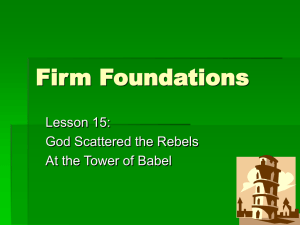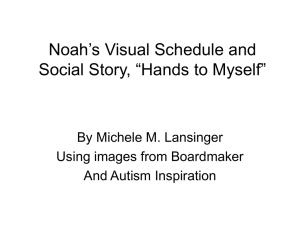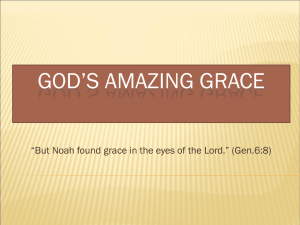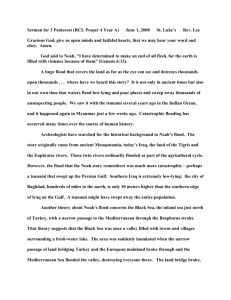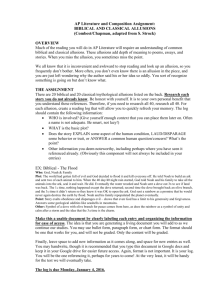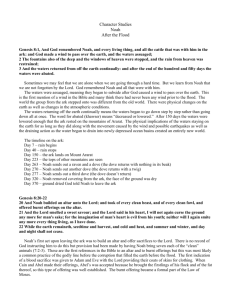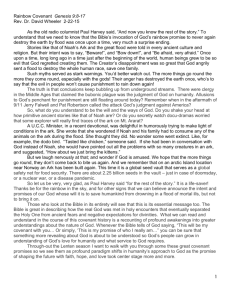Part2_08_CHAP6
advertisement
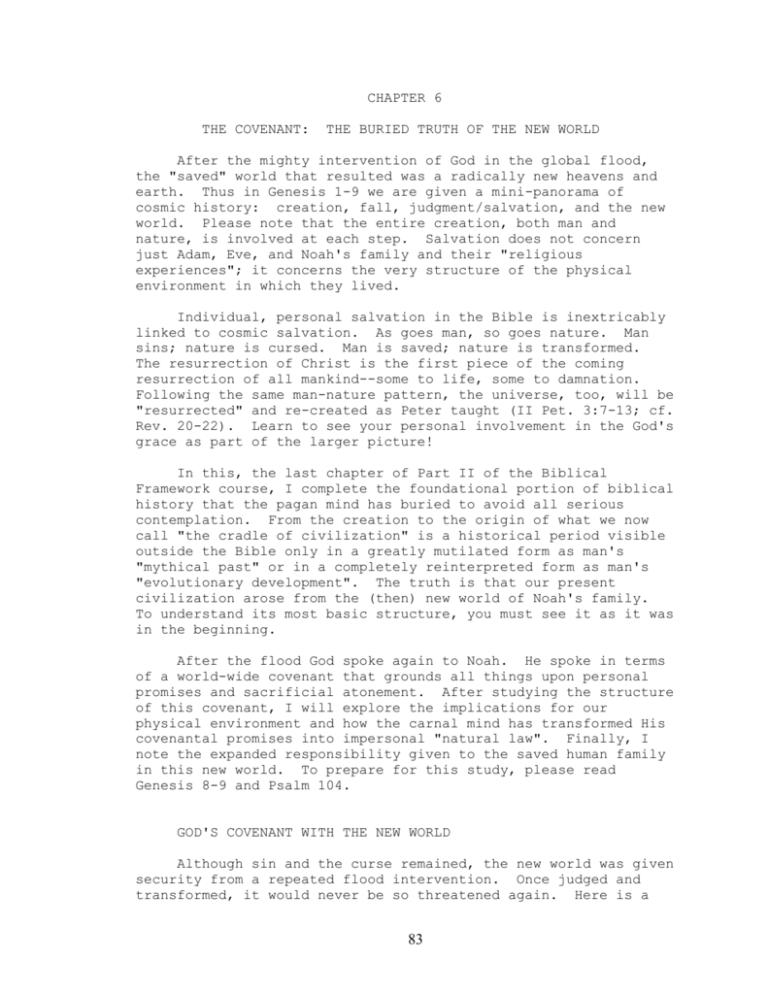
CHAPTER 6 THE COVENANT: THE BURIED TRUTH OF THE NEW WORLD After the mighty intervention of God in the global flood, the "saved" world that resulted was a radically new heavens and earth. Thus in Genesis 1-9 we are given a mini-panorama of cosmic history: creation, fall, judgment/salvation, and the new world. Please note that the entire creation, both man and nature, is involved at each step. Salvation does not concern just Adam, Eve, and Noah's family and their "religious experiences"; it concerns the very structure of the physical environment in which they lived. Individual, personal salvation in the Bible is inextricably linked to cosmic salvation. As goes man, so goes nature. Man sins; nature is cursed. Man is saved; nature is transformed. The resurrection of Christ is the first piece of the coming resurrection of all mankind--some to life, some to damnation. Following the same man-nature pattern, the universe, too, will be "resurrected" and re-created as Peter taught (II Pet. 3:7-13; cf. Rev. 20-22). Learn to see your personal involvement in the God's grace as part of the larger picture! In this, the last chapter of Part II of the Biblical Framework course, I complete the foundational portion of biblical history that the pagan mind has buried to avoid all serious contemplation. From the creation to the origin of what we now call "the cradle of civilization" is a historical period visible outside the Bible only in a greatly mutilated form as man's "mythical past" or in a completely reinterpreted form as man's "evolutionary development". The truth is that our present civilization arose from the (then) new world of Noah's family. To understand its most basic structure, you must see it as it was in the beginning. After the flood God spoke again to Noah. He spoke in terms of a world-wide covenant that grounds all things upon personal promises and sacrificial atonement. After studying the structure of this covenant, I will explore the implications for our physical environment and how the carnal mind has transformed His covenantal promises into impersonal "natural law". Finally, I note the expanded responsibility given to the saved human family in this new world. To prepare for this study, please read Genesis 8-9 and Psalm 104. GOD'S COVENANT WITH THE NEW WORLD Although sin and the curse remained, the new world was given security from a repeated flood intervention. Once judged and transformed, it would never be so threatened again. Here is a 83 preliminary and partial picture of the ultimate cosmic salvation yet to come. Judgment and deliverance will be final, never to be repeated again. And the basis of such security is clearly the atoning work of Jesus Christ on the Cross mirrored in the structure of God's covenant given in Noah's day. The covenant of Genesis 9 is the first mention of a covenant in the Bible. A covenant is a contract. Contracts in the ancient world were made between families (Gen. 21:22-24), between nations (Hos. 12:1), or between a monarch and his subjects (II Sam. 5:3). Although covenants (or treaties) have been widely used in history, the father of American biblical archeology, W. F. Albright, makes the stunning observation: "Only the Hebrews, so far as we know, made covenants with their gods or God."[1] Why do contracts between God and man occur only in the Bible? (Even today this amazing fact is remembered in the title "testament" given to the Bible.) Only the Hebrews had preserved for them the full revelation of the infinite-personal Creator that kept the Creator-creature distinction and absolute personal sovereignty. As we noted in Chapter 1 above, the universal pagan tendency was to lose hold of these truths and replace them with the Continuity of Being and impersonal chance. With whom would pagan man have a contract--a god or goddess who might be overthrown tomorrow? To have any such divine-human contract, you have to have a sovereign, omnipotent, Creator over all. The preconditions for a contract between God and man include not only the Creator's attributes but a relationship that must be verified with a witnessed record of compliance to specific terms. People and nations make contracts and treaties when either there has been a ruptured relationship in the past or there is a threat of discord in the future. Thus the covenant form was introduced with Noah, not Adam. Only after the fall and the flood could the necessity of a covenant be appreciated. This first covenant mentioned in the Bible is a sort of verifiable "peace treaty" made after God's triumphant war over evil. From this point on, He is known as a "covenant-keeping" God Whose behavior can be verified by actual historical record. Let's look at the covenant structure to see what it speaks about God and our relationship with Him. There are at least four parts to biblical covenants: the parties, a signing, legal terms, and a founding sacrifice. 1. The Parties to the New World Covenant. The covenant of Genesis 9 is made not only with Noah but with all of his descendants, the entire human race that came after him (Gen. 9:9). This means that every tribe and nation on earth is related to God through this covenant by virtue of their physical descent from Noah's family. Thus Paul in his evangelism to Greeks used 84 this "Noahic" covenant relationship as a stepping-stone to the gospel (Acts 17:26). Every nation and tribe has its past history anchored to biblical revelation through Noah. Gentile Job and his friends remembered this heritage (Job 22:15-17; 26:10-12; 38:8-11). Isaiah insisted that a line of unbroken revelation had always been present (Isa. 40:21) and that this covenant is archetypical of all future promises of God (Isa. 54:9). As late as the Exile, Ezekiel remembered Noah as one of three great saints known to the nations (Ezk. 14:14,20). Unlike later covenants, however, this covenant was not made with only humankind; it was made with all animals, too (Gen. 9:2,10,16,17). The original creation order of man and animals is re-established in the new world. Animals as well as men are addressed by God in specific terms discussed below. 2. The Signing of the New World Covenant. Each covenant is signed by the parties responsible for carrying out its terms. In the instance of the covenant in Noah's day, God alone signed it, not the other parties. God alone is making the promises, and God alone is responsible to be faithful to it. His "signature" is a manifestation of His glory throughout all the earth to every nation: the rainbow (Gen. 9:12-17). As I mentioned in Chapter 5, the origin of the rainbow after the flood has great significance. The rainbow testifies to a fundamental change in the earth's climate, but it does more than that. The optical phenomena we call the rainbow is actually a limited version of the glory of God surrounding His throne. Ezekiel reports rainbow-like quality of His throne's glory (Ezk. 1:28) and so does the Apostle John (Rev. 4:3). The significance of the rainbow, then, is that it reveals some of the glory of God Himself! It was added to the new world that survived the flood judgment as a sign of His Presence in a new way. Analogously, in the final New Universe to come, His Glory will be so great that there will be no need for sun or moon (Rev. 21:23). 3. The Legal Terms of the New World Covenant. What did God promise that would be open to verification? The legal content given was that neither the earth nor the animals nor man would ever again be judged by a global flood (Gen. 9:11,15-16). In the section below I will show just how vast the implications are for the physical universe. This promise expresses the total sovereign omnipotence of God over all the universe, including all chaos and natural evil. It is against this backdrop that God is trusted more than idols by the saints throughout the rest of the Bible. From the 85 standpoint of believers who lived after Noah, this covenant promise to contain the threatening powers of nature became amalgamated with God's original creation work. In Psalm 104, for example, His creating work (104:3-5), the flood judgment (104:69), and His providential rule (104:10-30) are all intermingled in praise to God and His judging work (104:1-2, 31-35). Through Isaiah God speaks of His saving work being as reliable as His promises in this covenant (Isa. 54). The covenant given to the new world in Noah's day was a basis and foreview of the ultimate covenant of peace with the redeemed forever (54:9-10). In Psalm 29 we see the point very clearly. Even the angels are called to join in praise to God (29:1-2). God's glory centers in this psalm in His voice (note the many references). His Word dominates all things, including the flood cataclysm (29:10). And the conclusion of the matter? He will bless His people with peace (29:11). Viewed in the light of these Old Testament passages Jesus' calming of the storm on the Sea of Galilee takes on deepened significance (Mark 4:35-41). The terms of this first covenant point to God's ability to save us and establish us in peace forever. The metaphorical implications are powerfully helpful to encourage us in the Christian life. 4. The Founding Sacrifice of the New World Covenant. The last characteristic of the covenant structure is that it is founded upon a blood sacrifice. Noah was instructed to take aboard the Ark seven of the clean animals for sacrifice instead of just a pair as he did with all the other animals (Gen. 7:2-3). These especially-selected animals would have to be preserved inspite of their immediate usage in sacrificial worship. After the flood Noah built an altar for sacrifice to the Lord (Gen. 8:20). By the expression "the Lord smelled the soothing aroma" we understand His satisfaction (propitiation) with this sacrifice. Only after this event, does He establish His covenant. Biblical covenants are with fallen men so they necessarily must be established on a graciously-supplied, founding sacrifice. No biblical covenants are bloodless. Man's righteous acts are thereby excluded as the basis of relationship. The covenant of Noah's day dramatically reveals that the preservation of all life, including the life of unbelievers, is due to an atoning work. Here you see a foreview of the atoning work of Jesus Christ as the basis for every blessing fallen man enjoys (I Tim. 4:10). 86 Exercise 6.1 1. Go back and review the pagan texts we studied in Chapters 2 and 4. Try to devise what a covenant would look like between the pagan gods and man. What problems arise? 2. If biblical covenants establish a framework of verifiability (that is, the behavior of the parties involved is to be checked), what implications does this principle have about every historical text in the Bible? IMPLICATIONS OF THE COVENANT FOR NATURE God's covenant with the new world concerns nature as well as man. The natural environment of this world is often used as the source of metaphors about spiritual truths. The Psalms, for example, use the imagery of the storms of life much as we still do in our language (Ps. 32:6; 124:4-5; 144:7). The sea is used as a picture of unstable humanity, vulnerable to any wind of spiritual influence in Daniel 7. Use of the sea/flood metaphor carries meaning inherited from this covenantal arrangement in Noah's day. So what do we learn about our natural environment from Genesis 8-9 that informs later metaphors? Nature Is Bounded By the Word of God. A covenant is open to verification. God's new world covenant promises that natural environmental processes will behave in certain ways and not other ways. All mankind will be able to check this behavior. Verification of this covenant verifies God's faithfulness to His Word which then becomes the basis of all future covenants (Isa. 54:9). Either His Word must control all natural processes, or the rest of the biblical revelation is meaningless. You learned in Chapter 3 the biblical view of nature. The biblical view of nature differs radically from that of paganism in both its ancient and modern forms. Paganism always attempts the impossible. It tries to universalize local knowledge without any logical justification for doing do. Scientifically-derived natural histories have to lay out a set of constants (basic physical laws, speed of light, logical rules, etc.) in order to build themselves. On what basis? Paganism, both ancient and modern, inevitably transforms the Creator-creature distinction and God's Personal Sovereign rule into some sort of Continuity of Being and Impersonal Chance. Of course, the doctrines of the Continuity of Being and Impersonal Chance are claims to universal knowledge. Yet on neither basis is there room for establishing true universals which are the preconditions for any knowledge! 87 The biblical view of nature resolves the problem of universals and constants in the immutability of the Creator. God's mind, not man's, is the source of rationality. With the New world covenant we learn more details of this biblical view Of nature. Now we have not only the abstract idea of natural constants, but we are given concrete specific constants open to observational verification. Clearly, His spoken words establish universal natural boundaries. No promise of immunity to global flooding on planet earth will work unless every part of extraterrestrial space is under control of the Promiser. If, for example, God was like some local pagan deity and controlled momentarily only the earth, He could not guarantee that some extra-terrestrial force would not interfere with the earth and cause a global flood. An asteroid from beyond the earth could pass by causing a gravitational tide sweeping all land under water. Mere local control is insufficient so the covenantal promises must actually be true universals valid throughout all the universe. However, while God's covenantal promises are spatial universal constants, they are not temporal universals. They are valid for post-diluvian history only. They apparently did not hold for the antediluvian world, nor will they hold for the Eternal World yet to come. Between the flood and the return of Christ there is a certain boundary on geophysical processes that cannot be violated. It is just at this point that we escalate the battle with paganism. Paganism as the product of the carnal mind at enmity with God can't stand awareness of His sovereign, omnipotent Word. It thus substitutes for the present experience of geophysical stability the idol of what is called "natural law." Paganism here uses the metaphor of human legislation to name its apostate attempt at getting universal constants. Not only does paganism err in converting God's personal Word into an impersonal process, it errs in thinking that these present processes have operated and will operate in much the same way forever. Peter paraphrased this idolatry as the belief "that all things continue from the beginning of creation" (II Pet. 3:4). In short, the covenant of Noah's day challenges every pagan view of nature because it insists that the real "universal" is not some metaphorical natural law but the Word of the personal Creator. It thus frustrates modern methods of creating natural histories all of which try to universalize local human experience and reason without justification. Let's look at some of the specific promises made in this covenant to contrast them with the natural law proposal of paganism. 88 The New Heavens and the New Earth. When I argued for the global flood interpretation of Genesis 6-8 in Chapter 5, I noted that the antediluvian world distinctively differed from the present one. The heavens, as well as the earth, were changed according to Peter's interpretation. The involvement of the heavens, as I just pointed out above, should not be surprising to anyone who is aware of the interaction between the earth and the rest of the universe. To radically change the earth without also changing the rest of the universe would be impossible. The heavens now support the "no-global-flood" earth. Astronomical bodies will never interfere with the earth in such a way to cause global flood-tides. Any such disturbing activity will be suppressed. Genesis 8:22 specifically claims that daily and seasonal cycles will continue. All of these promises require boundaries on the movement and changes of every astronomical body, boundaries which form the core of all astronomical observations today. The earth itself has radically changed. Instead of the strange hydrologic cycle involving artesian-like wells and diverging rivers from the highlands of Eden (see Chapter 5 discussion), we have widespread precipitation and a different river/continental configuration. (The present Tigris and Euphrates river systems must have been named from the antediluvian rivers by Noah's family after leaving the Ararat highlands.) Something about the new terrestial climate profoundly lowered human longevity as noted in the last chapter and likely had a similar effect throughout the biosphere. All mankind now lives in a new geophysical/biochemical steady-state bounded by God's verbal promises. Spiritual Lessons from the Physical Environment. The introduction of the rainbow with its beautiful optical phenomena brands the present terrestrial atmosphere with the mark of God's throne, a constant sign to all of Noah's descendents everywhere. This divine "signature", by differentially refracting white light into many colors, physically demonstrates how the watery elements of judgment only serve to bring out new aspects of God's glory! When later Scripture utilizes metaphors of storm and flood, it does so with the understanding that these manifestations of natural evil are so under God's personal, sovereign control that they can't help but bring out more revelation about Who God is. A stunning example occurred when Jesus stilled the Sea of Galilee storm with a mere spoken word. The Galilean storm only served to reveal the greater glory of the God of Noah as the Incarnate One. With a mere word, He can still the spiritual storms in our hearts today. God promised that the post-flood world would not suffer any further cursing (Gen. 8:21). Natural evils that now occur-- 89 storms, floods, earthquakes, disease--are outworkings of the fall and after-effects of the flood. They are not further cursings by God. Mankind now lives in a stable environment compared to the past and to the future transformation yet to come. There is a "Noahic order" to our environment that empirically testifies to the covenant-keeping Creator Who sits on the Throne. Now is the time to trust in His demonstrated trustworthiness. Exercise 6.2 1. The covenant implications for nature spell out a biblical alternative to the modern methodologies for constructing natural histories. Before reading Appendices B, C, and D, see if you can figure out what it is. How should one proceed who wants to reconstruct the past history of geophysical systems? What do you start with? Why? How far can this biblical method be taken? What are its limits? 2. After working with question #1, pick some area of natural history you are interested in, say biology or geology. From what you have read in this area, how does modern paganism start out? Why? How far can this pagan method be taken? What are its limits? 3. This series of studies has the objective of furthering "worship and obedience in an age of global deception." What have you learned about the deception of the pagan mind? What specific examples from modern thought can you now give to Paul's words in Romans 1:21-23? IMPLICATIONS OF THE COVENANT FOR MAN Although it spoke to the natural environment, God's covenant with the new world centered, of course, upon man. Man alone among all other creatures is theomorphic. I pointed out in Chapter 3 that man is uniquely designed. He is an image of God in both body and spirit. Through his body man rules nature. Through his spirit he communes with God and other persons. His spirit possesses characteristics such as choice, conscience, love, and knowledge that are finite replicas of God's divine attributes. As a descended progeny of Adam, all men share in special social structures which in Chapter 3 I called divine institutions. Far from mere arbitrary social conventions, these divine institutions have had revelatory functions from the the first moment of man's creation. We studied three--responsible dominion, marriage, and family--that were given in Genesis 1-2. 90 In Chapter 4 I discussed how the fall ruined man's design and his divine institutions. We have become abnormal in every way, requiring a salvation so radical it can truly be called a re-creation. We need both regeneration of the spirit and resurrection of the body. These saving actions, however, do not change the basic thrust of man's original design and purpose. Salvation is not an end in itself; it is to enable man to fulfill his original purpose as the lord of creation. Let's look at the interpretive problem of understanding how Noah's family started our present civilization. Then I will show how God empowered them to do just that. The Interpretive Problem of Understanding How Noah Founded of Present Civilization. When Noah, his family, and the animals which were saved along with him stepped into the new heavens and earth, they were to start anew what had begun in Eden. Only this time from the very beginning there was full knowledge of good and evil, of the effects of sin, of God's wrath and judgment upon it, of His gracious deliverance of those who trust Him with their lives, and of the need for a sacrifice that pleases Him (Gen. 8:20-22). It is very hard for us who have been raised with strong pagan influences in historical interpretation to even imagine the basics of what Noah and his family accomplished for us. One scholar who has studied Noah's contribution to the origin of civilization intensively for over 30 years is Dr. John Pilkey, professor of English literature at Los Angeles Baptist College. Pilkey has gone back to a Bible-based historical school of scholarship known as the "euhemerist movement" that flourished in Europe from the seventeenth through nineteenth centuries. Euhemerist scholars sought to interpret ancient history through the eyes of Genesis 9-11. They believed that stories of pagan gods were actually garbled tales of the civilization-founding activities of Noah and his sons. If you remember the graph in Chapter 5 of the longevitydecline of man after the flood, there is a striking anomaly in it. During the decline in longevity between Noah and Abraham, grandfathers outlived their grandsons--a never-to-be-repeated experience in human history. This strange era, the euhemerists believed, was the key to understanding how ancient civilization "exploded" into view. It also furnishes the clue to deciphering the tribal myths found around the world. If there were only a few centuries between Noah and Abraham, then ancient civilization in Egypt and elsewhere must have been established rapidly. Such rapid development of society could only have occurred if there was brilliant (Pilkey calls it "charismatic") leadership--architects, engineers, farmers, and political leaders--who spread out quickly into the earth to 91 subdue it. Pilkey notes that such a brilliant core family behind the rapid origin of our civilization is inconceivable to modern man. We cannot accept the total "godlike" authority that would have been required for such a project because of our democratic ideals: "Noah's family has not been clearly conceptualized because there is something truly frightening about such a family to scholars of the modern democratic era. . . .The fear of falling victim to merciless despotism is the democratic soul of evolutionary thought, which refers the origin and maintenance of civilization to gradual or powerless processes rather than to charismatic power. A fourth millennium Pharaoh Menes is a harmless cipher; a third millennium Pharaoh Menes is part of a sublime and terrifying spectacle. The latter chronology implies that Noah's family were empowered to build world civilization overnight. . . . As democrats, we reserve the right to paint emperors in our own image. We do this at the risk of fulfilling the prophecy of Jude who warned that some of us would deny the 'monos despotes' Jesus Christ, through a popular distaste for despotism in general. Prior to the democratic revolutions of the later eighteenth century, scholars found it easier to think clearly about Noah than they do today, despite our advantage in positive evidence. . . .[2] To think clearly about Noah starting civilization in the new heavens and earth, means that we can understand the nature of what the Bible calls the "cosmos"--the spiritual and physical order in human society. It all began with saved people delivered from a damned world, and yet it has become something evil in its very structure. Pilkey notes: "By viewing Noah as a mere survivor of the Flood rather than a builder of nations, we have not only neglected his 350year postdiluvian lifetime, but have ignored those spiritual ideas which made the gentile world just that, a designed cosmos. . . . In estimating the spiritual worth of Noah's cosmos, we are faced with the striking fact that its gentile populace, if not the cosmos itself, will survive all subsequent judgments into the millennium and eternal state . . . .On the other hand, the prophecy of Daniel 2:44 reveals that this cosmos, as the seat of political authority, must be destroyed. Gentile political power must yield to the Messiah of Israel and, in doing so, will extinguish a peculiar regime dating back to Noah's postdiluvial lifetime."[2] The interpretive challenge to a modern Bible-believing Christian is how to bring his thoughts of history under the obedience of Scripture. In previous chapters we encountered matters of philosophy, language, psychology, and science; now we encounter 92 matters of history. Just how could Noah's family have built present civilization with only a few centuries of effort? The Re-installed Divine Institutions. When God made His covenant with the new world, He restated the role of mankind in language similar but not identical to that of Genesis 1. 1. The First Divine Institution (Responsible Dominion): Compare Genesis 1 and 9: Genesis 1:28-30 "Be fruitful and multiply and fill the earth, and subdue it; and rule over the fish of the sea and over the birds of the sky and over every living thing that moves on the earth." Then God said, "Behold, I have given every plant yielding seed that is on the surface of all the earth, and every tree which has fruit yielding seed; it shall be food for you." Genesis 9:1-4 "Be fruitful and multiply and and fill the earth. And the fear of you shall be on every beast of the earth and on every bird of the sky; with everything that creeps on the ground, and all the fish of the sea, into your hand they are given. Every moving thing that is alive shall be food for you; I give all to you as I have the green plant. Only you shall not eat the flesh with its life, that is its blood." Besides the obvious re-installation of man's dominion over the earth, there is a new theme of living creatures' fear of being eaten by man. The "Noahic new world order" is a carnivorous one. Nevertheless, as God bounded post-flood nature by His Word, so He bound post-flood man by His Word. Man is not to callously eat flesh with the blood still in it. There are bounds of respect for life that must be observed. A hunter friend of mine, after studying this passage, told me how it changed the way he hunted. The act of draining the blood from a carcass made him much more aware of the sacrifice that had just been made in order for him to eat. Precisely. The new world order was grounded upon post-fall realities. In exercising dominion from this point forward man is forced to acknowledge his dependence upon substitutionary death. Others must die, that he might live. God wants us to respect the life that is given up and acknowledge that it is His, not ours. Genesis 9:4 limits our claims on animals when we kill them for food. The only exception is given by Jesus thousands of years later when He said not only to eat His flesh but also to drink His blood (John 6:53-56). His life is wholly given to us in an act so unique that the Church 93 was commanded to remember it always. Apart from this unique exception, however, man is limited to the flesh, not the blood. Even this dietary detail of Scripture is challenged by paganism. Over against the Bible's dietary practices of beef, lamb, and fish consumption, paganism often claims that meateating is harmful and that vegetarianism should be the norm. The Apostle Paul, however, writes that such vegetarian claims are demonic in origin (I Tim. 4:3). At least one Christian medical counselor reports that vegetarianism seems to be associated in occult religion with heightened spiritist capacities. She has suggested that with the diminished vigor of post-flood human bodies, there is a need for concentrated protein in the diet to endure spiritual conflict.[3] Not only is man's daily bodily life to be sustained by substitutionary death, but the earth beneath his feet with its fossils speaks of death. Oil as fossilized animal remains is today consumed for energy everywhere. Modern civilization from Noah is built in manifold ways upon death that it might have life. This aspect of the present age is revelatory of God's workings. Paganism rushes in to suppress all awareness of our need as fallen creatures to "feed" on the life of others. Such revelation is too preparatory for the gospel! 2. The Second Divine Institution (Marriage): With the command to multiply and fill the earth God reassured the Noahic order that marriage was to continue. The four men and women who were saved by the Ark brought all the genetic material for the present human race. All racial diversity observed today comes from the DNA of Noah's family. Some scholars think that racial diversity began with the new world for the same reason that striking diversity seems to have occurred in the animal kingdom. From horses and cattle to dogs and cats there has been obvious diversification from the original Ark pairs. Whether this diversification was carried potentially by the Ark inhabitants or was multiplied by post-flood environmental factors is not known. The occurrence of antediluvian geographic names in the old four-river planetary hydrologic system (Havilah and Cush in Gen. 2:11,13) which occur again in the new post-flood world suggests that perhaps racial diversity did exist prior to the flood. Pilkey has suggested that the four wives in particular may have come from four regions of the old earth. They would have then brought more racial diversity than might be accounted for from Noah and his sons alone.[4] Whatever role the four women played in repopulating the earth, they were God's chosen co-workers with the four men. Dominion cannot occur without both man and woman working together. Living for many centuries in bodies far more powerful than their children, these four couples pioneered the origin of 94 today's oral of conduit working civilization. They transferred all records written or God's Word to our post-flood society. They were the of antediluvian technology--architecture, music, metal(see Gen. 4:17-22). 3. The Third Divine Institution (Family): Along with responsible labor and marriage, the God re-installed the divine institution of family in Noah's day. In Chapters 3 and 4 I noted that the family was created as the basic social unit that exercises dominion but that after the fall it was corrupted. Instead of harmony and a training ground for authority, love, and responsibility, it became a chaotic association that produces rebelliousness, insecurity, and blame-shifting. This tension between how it "ought" to function and how it actually functions was carried into the new world. Noah's family as the saved social unit was to fill the new earth and rule it. This pioneer family would have enormous power in a way no other family has ever had or ever would have. Due to the declining longevity curve, Noah's family could dominate their weaker children for several generations. The three sons--Shem, Japheth, and Ham--founded all the nations and racial sub-groupings of our present civilization. In Section III of this series I will show in more detail from Genesis 10 and 11 how these three sons shaped history as we know it. Out of this first post-flood family arose 70 nations (Gen. 10). This pattern of 70 nations was designed by God to anticipate the pattern of 70 sons of the redeeming family of Jacob (Deut. 32:8). Each of these 70 nations carry inherited characteristics from one or more of Noah's three sons. They would do so according to God's purposes for history. As physically and culturally powerful as it was, however, the Noahic family from the very beginning was spiritually flawed. You glimpse evidence of this flaw in Genesis 9:20-27. Through a fruit of his dominion over the earth, Noah became drunk. One of his sons then dishonored his father. And Noah delivered a prophetic oracle to his sons that outlined all of subsequent human history. In a microcosm this family incident revealed the spiritual conflict of all postdiluvial civilization. Unlike a pagan story that would feature the founding "god" or king with all of his power and glory, the Bible balances Noah's titular position with his fallen nature. Wine as a fruit of dominion can provide the blessing of happiness and health to man (Ps. 104:15; Isa. 25:6 cf. Jn. 2:1-11; I Tim.5:23), but there are limits on its use (Lev. 10:9; Prov. 31:4-7; Eph.5:18). Dominion requires wise knowledge, and wise knowledge requires obedience to God's interpretation of all things. Man's knowledge, no matter how extensive, forever remains but a finite replica of God's 95 omniscience. Wine as part of creation, to be used wisely, must be interpreted by what God says about it. Paganism exalts the carnal mind. Not wanting to be submissive to God's authoritative knowledge, it always attempts to go its own way. Man, it is claimed, should be free to use the creation whatever way he wants to. Does he produce wine? What a wonderful anesthetic for all the suffering in a fallen world! So paganism thanks the god Dionysius for its intoxicating "saving" qualities. By contrast, the Bible treats it soberly as just another part of creation that must be used with wisdom. Moreover, the biblical narrative reminds us that the founding family also experienced rebelliousness against norms of the conscience. In dishonoring his father by gazing at his nakedness rather than covering him and by brazenly talking about it to his brothers, Ham showed character traits that he would pass on to his descendents. These traits would come to full fruition in one of Ham's sons, Canaan, and his "nation". As Allen Ross writes: "As a part of the theological justification for Israel's subjugation of the Canaanites, this passage had great significance. . . .The Torah warned the people of the exodus about the wickedness of the Canaanites in terms that call to mind the violation of Ham (Lev.18:2-6). . . .The constant references to "nakedness" and "uncovering" in this passage in Leviticus, designating the people of Canaan as a people enslaved sexually, clearly reminds the reader of the action of Ham, the father of Canaan. No Israelite who knew the culture of the Canaanites could read the story of their ancestor without making the connection."[5] By revealing this flaw in civilization's founding family, the Bible warns us that the cultural glory of the Noahic cosmos lacks spiritual life. Mighty though the Noahic nation builders might be, impressive though their technological accomplishments appear, they were still fallen men in absolute need of spiritual salvation. Not only would their diet require the sacrifice of life, but descendents who unrepentantly followed in sin would themselves be sacrificed. Ham's sin nurtured in Canaan demanded that Canaan be one day exterminated. The Noahic family of nations would have to pass through a future purging of all unbelief, a purging yet to come on a global scale with the return of Christ. The New Divine Institution. When God re-installed the original divine institutions of Genesis 1-2 after the flood, He added a new one: "And surely I will require your lifeblood; from every beast I will require it. And from every man, from every man's brother I will require the life of man. Whoever sheds man's 96 blood, By man his blood shall be shed, For in the image of God He made man.'" Genesis 9:5-6 God transferred to man the responsibility to exercise kingdom authority which today we call "civil government." The source of civil authority is the responsibility to express the wrath of God over destruction of human life with capital punishment. If an animal's life was to be honored during the eating of meat (Gen. 9:4), then man's life as a replica of God was even more deserving of honor. Whether an animal or another man took a human life, restitution of life for life had to be made. The new heavens and new earth were to be a place where God's image was to be honored. As Creator, God set the theomorphic image of Himself at the creature level just as ancient kings would do (cf. Dan. 3). He expected that image to be honored by every creature, including man himself. Prior to the flood, human life apparently was left at the mercy of men and angels without kingdom authority. The first murderer, Cain, could not be executed apparently because of lack of this authority (Gen. 4:15). Execution, however, could be done by at least some angels: the angelic guards of the garden of Eden bore the sword (Gen. 3:24). Evidently, the angels and men became corrupted together and anarchy reigned prior to the flood (Gen. 4:23-24; 6:2-5; cf. I Pet. 3:18-20; Jude 6(?)). After the flood, however, God clearly gave kingship authority to man expressed in his responsibility to exact life for life. A new dispensation in human history had begun; man's dominion was expanded. This new divine institution, unlike the previous three, was a post-fall social structure. It deals with the reality of evil. The civil sword is a ministry of God expressing wrath upon those who practice evil (Rom. 13:4). It is an outer, partial supplement to man's inner conscience (Rom 13:5). This heightened responsibility which was transferred to Noah's family reveals more about how much man truly is the finite replica of God. The function to rule and judge belongs to God. In Psalm 82, therefore, human rulers are called "gods" in spite of their fallen natures. In the future the redeemed and resurrected saints will judge the angels (I Cor. 6:3) and, with Jesus, shall rule "with a rod of iron" (Rev. 2:26-27). The present "installment" of this future kingdom authority is this civil government responsibility given through the new world covenant. The institution of kingship authority was remembered by ancient man. Pilkey writes: "The Sumerian king list attests to the [new dispensation of human government], claiming that 'kingship descended from heaven' after the Flood. This descent of power was far more 97 like the Christian Pentecost than we imagine. Its universal gentile symbol was the 'Ka' sign, the pictographic image of a man with arms upraised at the elbows."[6] This memory, however, was quickly distorted by the ever working pagan agenda. Under this program man must be the highest authority. God's sign of His throne glory in the rainbow overhead must be ignored and "reinterpreted". Physical and cultural glory of the flesh must eclipse the spiritual concerns of man. Kingship is thus "explained" in ancient paganism as coming from Fate and the gods or in modern paganism as deriving from man-made voluntary covenants or the majority vote of the moment. The fleshly mind's hatred for this new world order under God shows itself in many ways. With some, it's a lust for the preflood anarchy without the "oppressiveness" of civil government. Of course, civil government is vexing to us because it is a postfall institution that points to our rebelliousness. With others, it's a revulsion over military, police, and capital punishment responsibilities. Even Christians join in the hatred for this fourth divine institution by agreeing that capital punishment is barbaric, unnecessary, and unjust. Let's review the biblical case for capital punishment. Three objections are usually brought against capital punishment in both its domestic form (executions) and its foreign policy form (just war): (1) it doesn't deter evil; (2) it cannot be administered justly (the poor are less able to defend themselves); and (3) it is sub-Christian ethically. In reply it can be argued that: (1) it would deter evil if it were conducted as God intended with fair and speedy purpose; (2) it was given for a fallen world, so obviously God believes it is necessary, justly carried out or not (He foreknew, for example, of the death of His own Son through a miscarriage of justice when He established it); and (3) it is directly sanctioned by Jesus and the apostles for the present time until Christ returns to take over its administration Himself as the Son of Man (Matt. 8:5-13; Luke 3:14; 22:35-38; Acts 25:11; Rom. 13:1-4; Rev. 19:17-21). Of course, no one likes capital punishment, but the issue is what God has installed and assigned for our present, fallen civilization deriving from Noah and the covenant. Kingship and capital punishment go together from Noah on through the establishment of the Messianic kingdom to come. Capital punishment reveals the restitutionary nature of justice which I will develop further in Section III of this series. It provides the framework for the Cross of Christ and the atonement for sin. Kingship rule anticipates the coming Son of Man who will reign over all the nations to finally establish the Kingdom of God physically as well as spiritually. Anarchists, humanist 98 opponents of capital punishment, and pacifists are, therefore, in principle rebels against God's Word. The new world of Noah's day was given a specific design through the covenant. It was a new beginning for all of creation--man and nature alike. Its characteristics remain with us today: a specific geophysical structure, a carnivorous change in human diet, and the presence of civil government. Post-flood civilization is a relatively stable environment that is sustained by death. To bemoan the alleged "failure" of this design is to blame God for what man is responsible for. Any failure of modern civilization is not due to human physical and intellectual domination of nature or to the institution of civil government. It is due to the outworking of the spiritual flaws inherent in the first family. And the solution to modern ills is not trying to re-create pre-flood conditions of "getting back to nature"; it is through the spiritual struggle to purge sin from our hearts as God supplies His grace. Exercise 6.3 1. How do the four events of Genesis 1-9 form a group that shows the basic outline of cosmic history? 2. If paganism distorts God's covenantal rule over nature with the concept of "natural law", how does it distort the history of the origin of modern civilization? Why does paganism do this? 3. Compare and contrast biblical and pagan views of civil government. Explore their radically different views of authority: where it comes from, what controls exist for it, and why there always seems to be "power struggles". END NOTES FOR CHAPTER 6 1. William F. Albright, Yahweh and the Gods of Canaan (Garden City, NY: Doubleday & Co., 1968), p. 108. 2. John Pilkey, Origin of the Nations (San Diego, CA: Book Publishers, 1984), p. 3f. Master 3. Rebecca Brown, He Came to Set the Captives Free (Chino, CA: Chick Publications, 1986), pp. 184-7. 4. While Pilkey has brought about brilliant insights into the origin of the nations, he also strangely insists that observed racial diversity could not have been brought about within monogamous marital ethics. He believes "marital irregularities" consisting of "polygamous concubinage" and "sibling incest" were necessary to generate the present human race. While such 99 irregularities might have occurred, to say they were necessary demeans the design of the second divine institution as sufficient to generate the race. 5. Allen P. Ross, Creation and Blessing (Grand Rapids, MI: Baker Book House, 1988), p. 218f, 217. 6. Pilkey, p. 6. 100 CONCLUSION Is God, then, Who He claims to be in the early chapters of Genesis? Is He the infinite-personal Creator of all things in both heaven and earth, immaterial and material? Is He the source of language and logic? Has He designed man and nature in specific ways? Was the universe at one time free of evil, death, and suffering? Has there been a cosmic judgment/salvation in past history? And do today's social institutions owe their origin to His Word? Or is modern paganism correct in claiming that early Genesis is "mythological"? Would any god, if he (or she) existed, only be a sort of superman/woman inside an unknowable, mysterious universe? Is language and logic merely the result of chemical actions in the human brain? Is man merely a section in the great Chain of Being? Is what is called evil an inherent characteristic of existence? Are today's social institutions purely arbitrary conventions that can be radically re-engineered by man? These are two radically-conflicting origin stories. One is the historic biblical one; the other, in its modern evolutionary form, is the officially-sponsored myth of nearly every developed country today. Well-endowed with tax dollars, the evolutionary origin-myth assaults the credibility of the Christian gospel. It renders the Bible as just a religious story book. Christian experience is interpreted by it as a mere subjective opinion. And if you want to succeed in academia today, you're expected to acknowledge it as the only rational view of reality possible. Bible-believing Christians, however, know that all spiritual truth begins with belief that "God the Father Almighty" is "Maker of heaven and earth." We must strive, therefore, to put the world around us within the context of the Biblical view of reality rather than putting the Bible within the context of the pagan worldview. The four events and the associated revelation which we have studied in this Part II of the Framework course will give you the tools to do just that. Instead of letting the powerful Word of God lose its force by being "absorbed" into the framework of unbelief, you ought to be able to "absorb" unbelief into the framework of the Word. You've been exposed in these chapters to many areas of life where the conflict rages: language, logic, mathematics, geology, physics, sociology, psychology, and history. Now you must learn to "bring every thought captive to the obedience of Christ" (II Cor. 10:5) wherever you are. Perhaps by God's grace you will be lead to expand truth by rightly ordering observational data and logical analysis in your area of expertise. May the God of the Bible be so glorified! 101 REVIEW QUESTIONS 1. The events of creation, fall, flood, and covenant narrated in Genesis 1-9 provide enough material to start our imaginative and creative thought processes. Try matching some of the details of the Genesis narrative below with the listed situations where the Word could be used to interpret and control them. 2. a plague of a highlycontagious disease Noah's lapse in drunkenness and nakedness legalization of homosexual marriages God speaking light into existence literary criticism of the Bible God's curse upon the ground trying to test whether Christianity is true God's death sentence on man central planning of just and fair prices decline in longevity after the flood attacking technology as civilization's enemy divine institution of marriage a tragic accident that appears meaningless God naming His work before Adam existed racism divine institution of family lack of sense of authority in young people divine institution of responsible dominion "religion" is a private matter of the heart; not something that matters in the physical universe Adam as the original DNA source; Noah's family as the intermediate source human growth hormone therapy as the hope of abolishing aging Eve's indecision over whether God or Satan was right in their opposing claims grand theory of the universe based upon behavior of light energy Creator/creature distinction and man as God's image Try to tell the story of Genesis 1-9 from memory. 102
